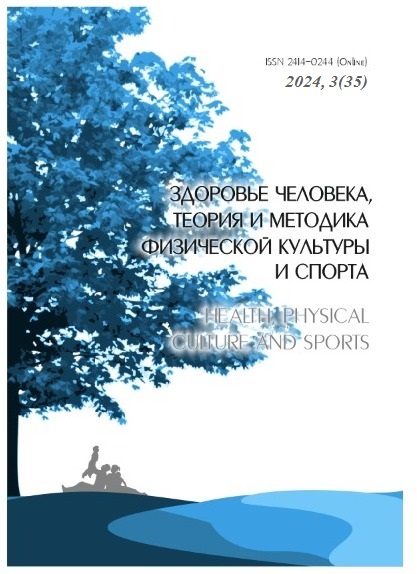CORRELATION OF SCHOOL-AGE CHILDREN'S IDEAS ABOUT A HEALTHY LIFESTYLE WITH HEALTH CARE PRACTICES
Abstract
Introduction and purpose of the study. The study of the lifestyle of the child population is of particular importance in view of the aggravation of the problems of maintaining public health, as well as taking into account the determining influence of behavioral factors on the risk of chronic diseases. The purpose of this work is to examine the relationship between children's ideas about what a healthy lifestyle is and their established health care practices.
Material and methods. The information base of the study was made up of data from the cohort longitudinal study "Studying the conditions for the formation of a healthy generation" conducted by the Federal State Budgetary Educational Institution of the Russian Academy of Sciences. Medical and social monitoring is carried out annually, covering the entire period of growing up of children of each recruited cohort until they reach the age of 18. The method of conducting the research is a written survey of respondents at their place of residence. Within the framework of this work, the answers of children aged 10 and 15 years old to questions about their understanding of a healthy lifestyle and health care practices were considered. The monitoring data made it possible to trace how the distributions of children's opinions changed as they grew up using the example of two cohorts – 2001 and 2004.
Results. It is shown that ideas about a healthy lifestyle change as children grow up. Based on the correlation analysis, the most pronounced consistency was revealed between the inclusion of the main components of a healthy lifestyle and their implementation for such practices as proper, balanced nutrition, absence of bad habits, and outdoor walks.
Conclusions. It is shown that for a long period, the problem of insufficient involvement of children in sports and physical education persists against the background of their awareness of the obligation of this practice to promote health. It is proved that a high level of preventive medical activity among the child population is achieved due to the control of mandatory medical examinations by adults. At the same time, children themselves do not perceive this practice as an obligatory component of a healthy lifestyle. The results obtained may be of interest to specialists engaged in research on the health of the child population.
Downloads
References
Безруких М. М. Школьные и семейные факторы риска, их влияние на физическое и психическое здоровье детей // Вестник практической психологии образования. 2011. № 1(26). С. 16-21.
Журавлёва И. В., Лакомова Н. В. Региональные особенности отношения подростков к здоровью и окружающей среде // Социологическая наука и социальная практика. 2020. Т. 8, № 4. С. 88–104. DOI: 10.19181/snsp.2020.8.4.7658
Короленко А. В. Семейное воспитание как фактор формирования здоровья и человеческого потенциала детского населения // Карельский научный журнал. 2018. Т. 7. № 4(25). С. 52-56.
Лисицын Ю. П. Общественное здоровье и здравоохранение. М.: ГЭОТАР-МЕД, 2002. 510 с.
Модестов А. А., Косова С. А., Иванова А. А., Федоткина С. А. Здоровьесберегающее поведение подростков и молодежи как основа здоровья будущих родителей // Российский педиатрический журнал. 2012. № 3. С. 46-50.
Новоселова Е. Н. Роль семьи в формировании здорового образа жизни и смягчении факторов риска, угрожающих здоровью детей и подростков // Анализ риска здоровью. 2019. № 4. С. 175-185. DOI 10.21668/health.risk/2019.4.19
Потехина Н. Н., Дьячкова М. Г., Колесникова И. А., Чуйко А. В., Докучаева М. И., Борисова Т. А., Меньшикова Л. И. Особенности образа жизни и выработки самосохранительного поведения подростков и молодежи // Экология человека. 2009. № 8. С. 61-64.
Пилюшенко А. В. Вопросы теоретического осмысления категорий "образ жизни" и "здоровый образ жизни" // Вестник Томского государственного университета. 2015. № 398. С. 50-54. DOI 10.17223/15617793/398/8
Яковлева Т. В., Иванова А. А., Терлецкая Р. Н. Проблемы формирования здорового образа жизни у детей и учащейся молодёжи // Казанский медицинский журнал. 2012. Т. 93. № 5. С. 792-795.
An author should not normally publish manuscripts describing essentially the same research in multiple journals or publication venues. Such redundant publication is generally considered to constitute unethical publishing behavior, and if discovered may result in a manuscript under consideration being rejected, or a published article being retracted.
Authors of manuscripts reporting on original research should present an accurate account of the work performed, accompanied by an objective discussion of its significance. Underlying data should be represented accurately in the manuscript. The manuscript should contain sufficient detail and references to permit others to replicate the work. The fabrication of results and the making of fraudulent or knowingly inaccurate statements constitute unethical behavior and may be cause for rejection or retraction of a manuscript or published article.





